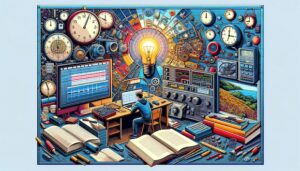Embarking on the journey to become a licensed amateur radio operator is an exhilarating endeavor that melds technical learning with practical application. Yet, the path to passing the ham radio exam is fraught with challenges. Understanding these obstacles and employing effective strategies to overcome them can significantly ease your preparation process. This comprehensive guide delves into the biggest challenges aspiring hams face and offers insights, resources, and tips to conquer these hurdles.
1. Vastness of the Subject Matter
Challenge:
The ham radio exam covers a wide array of topics, from electronic theory and FCC regulations to operating practices. The breadth of knowledge required can be overwhelming for newcomers.
Solutions:
- Break Down the Syllabus: Divide the syllabus into manageable sections and focus on one topic at a time.
- Use Structured Study Guides: Resources like the ARRL Ham Radio License Manual are meticulously organized to guide you through each subject logically.
- Leverage Online Resources: Websites like HamStudy.org provide comprehensive study tools, including flashcards and practice exams, to cover the syllabus effectively.
2. Understanding Complex Technical Concepts
Challenge:
Technical subjects such as electronics theory and antenna design can be daunting, especially for those without a background in these areas.
Solutions:
- Visual Learning: Utilize YouTube channels such as Ham Radio Crash Course and Dave Casler for visual explanations of complex concepts.
- Hands-On Practice: Engage in practical experiments using simple electronic kits or simulation software like LTspice to solidify your understanding.
- Seek Mentorship: Connect with local amateur radio clubs or online forums like QRZ.com to find experienced hams willing to mentor beginners.
3. Memorizing FCC Regulations
Challenge:
The exam requires knowledge of specific FCC rules and regulations, which can be dry and difficult to memorize.
Solutions:
- Create Mnemonics: Develop mnemonic devices or acronyms to remember key points and regulations.
- Regular Review Sessions: Incorporate spaced repetition into your study plan to improve retention.
- Practice Exams: Use the practice exams on HamExam.org to familiarize yourself with how FCC regulations are tested.
4. Time Management
Challenge:
Balancing study time with personal and professional responsibilities can make exam preparation challenging.
Solutions:
- Set a Study Schedule: Dedicate specific times of the day to study and stick to this schedule.
- Set Realistic Goals: Establish weekly goals to ensure steady progress without burnout.
- Use Study Apps: Apps like Anki and Quizlet can make use of short, idle moments for reviewing flashcards.
5. Exam Anxiety
Challenge:
Fear of failure or test-taking anxiety can hinder performance, regardless of how well-prepared you might be.
Solutions:
- Mock Exams: Take full-length, timed practice exams in a simulated test environment to build confidence.
- Relaxation Techniques: Employ mindfulness or breathing exercises to reduce anxiety.
- Positive Visualization: Imagine successfully passing the exam to create a positive mindset.
Additional Resources for Success
- ARRL: www.arrl.org offers a wealth of information, including study materials and links to local clubs.
- Reddit’s Amateur Radio Community: www.reddit.com/r/amateurradio is a great place for advice and support from the amateur radio community.
Conclusion
Studying for the ham radio exam is undoubtedly challenging, but with the right approach and resources, passing on your first attempt is within reach. Embrace the journey, leverage the wealth of resources available, and connect with the amateur radio community to enrich your learning experience. Remember, each challenge overcome is a step closer to joining the global network of amateur radio operators. Good luck

Keep this going please, great job!